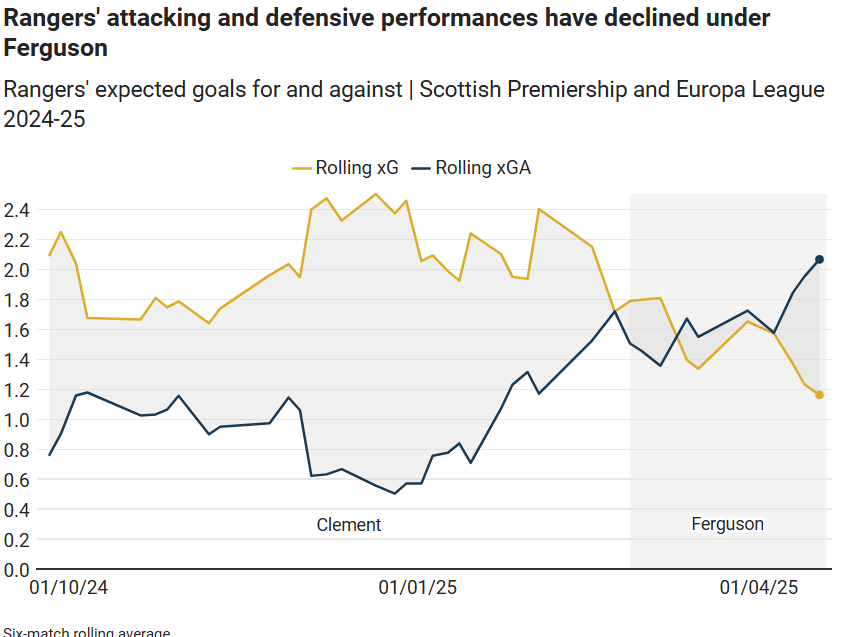Leaderboard
Popular Content
Showing content with the highest reputation on 19/04/25 in all areas
-
4 points
-
3 points
-
Simply untrue. Q. Why are we unstainable? A. We are unstainable due to a decade of terrible boardroom decisions.3 points
-
It'll depend on who we get as manager, sporting director etc. I didn't say it would be pish easy, far from it, but done correctly it won't cost the earth and shouldn't take too long to implement. To win the title, we only have to finish above 1 team. We've beaten them twice this season. We've lost the league due to our inability to create a playing style that can beat the low block. We needn't spend a fortune to beat Hibs, Hearts and Killie. A well coached, hungry and fit team will win us the league. As for your final question, that also depends on the above.3 points
-
3 points
-
Yeah, and it's been confirmed. The new kit designs are approved and will be released in the summer (or shortly after the take over is announced- which ever comes first).2 points
-
FootyHeadlines leaked ages ago that Umbro is making our new kits. Under licence via Castore.2 points
-
If you're looking at that record and think it's bad, then we'll have to agree to disagree.2 points
-
A real question that I think that I know the answer to. Regardless of current regime or new regime. We need to become sustainable. The support didn't like it under the current regime from when John Bennett stated it last summer. I don't think they'll end up liking it under the new regime, either. To become sustainable without the associated pain would need us to appoint the new Alex Ferguson and just about every signing to be a roaring success.2 points
-
It's a development arm of a sports' business. I don't think it is a separate entity. Cavenaugh is not a sports' business guy, and it seems that when the 51% threshold is reached, he will own 26%, and the 49ers, 25%. It seems to me that if you want to invest in sports, you might be wise to get in tow with people who know how to run sports' businesses. We can assume for the moment that Cavenaugh, and the 49ers are on the same page.2 points
-
Think a few are in for a shock , almost every other company that has yanks as owners hate them. Americans are interested in one thing and thats getting the most amount of cash out of anything they dip into , nothing else matters.2 points
-
We tend to lose about 10M a year when we were relatively successful. We need to become a sustainable business then build on that foundation. It isn't easy when your direct rival has already built that foundation and are years ahead of you What has happened is that we continually look for short cuts that of occasion may bear a little fruit but then the bills have to be paid.2 points
-
Who is going to be buying most of the shares ? Venture Capitalists from 49ers or healthcare parasite, Cavenagh.2 points
-
I think it is harsh to judge these young players, who have all shown glimpses of their potential, on this season alone. The club has been a basket case from top to bottom.2 points
-
I won’t be putting my hand in my pockets to help maximise profits for some American. I have no choice but to do that in other areas of life.2 points
-
The boy who was a scout when Wilson was here and was involved in singing massive duds like Ridvan, Matondo and Ben Davies is still here and was given a promotion. Wilson was never a scout. He didn’t do a good job here by any means but he didn’t identify players. The scouts did, and many of the same faces who have failed over the years need replaced before we start recruiting again. That’s the biggest value Koppen can add this close season.2 points
-
A new Brigadoon themed "away" strip is on the way. Well, how often do we actually win things? It's been leaked on-line. Below are a couple of cheerleaders modelling it.... Yanks, eh?1 point
-
Some interesting, and objective, observations from The Times' football stats and data man, on BF. Barry Ferguson’s tactical notes left Rangers lost in Bilbao The interim head coach’s instructions confused his own side in their Europa League quarter-final second leg and reflect a wider theme from the Premiership Ferguson passes on a tactical note to Tavernier during the Europa League defeat ANDER GILLENEA/AFP Hamzah Khalique-Loonat, Football Data Journalist Friday April 18 2025, 7.20pm, The Times Barry Ferguson initially attempted to bat away questions about his Rangers future but, eventually, bit at one, “I know I can do the job,” he said. The Rangers manager was in a defiant mood. Coaches have a short time to compose themselves after a match before heading into their post-match press conferences, but more often than not, they are still stinging after defeat. This was no exception and when Ferguson spoke, his words came from his heart. So despite advancing his own ambitions to lead Rangers permanently, Ferguson also channeled his emotions as a proud supporter and former player. “I’m just concerned in terms of what happens; I just want my club to get back to where it should be,” he said. “That’s my main concern. Whether that’s me or somebody else, and if it’s not me, I’ll fully support them. I’ll go back and do what I was doing before and get right behind [them], making sure that we get the club back to winning trophies on a regular basis.” This was not his finest hour. The manager had reshuffled and reorganised his team throughout the game via slips of paper delivered onto the field, and they looked lost for large periods of it, as only Bilbao’s errant finishing spared Rangers an embarrassing scoreline. Most of ’recent failings cannot be laid at Ferguson’s door. He inherited a listing side, whose failings look worse because of Celtic’s brilliance in the league, and bravely offered to help right the ship. But that makes no difference to Rangers’ board who, come the end of the season, will have to consider whether Ferguson, at this point in his managerial career, is the figure to lead the club. Underlying statistics suggest that Rangers have got worse under Ferguson ION ALCOBA BEITIA/GETTY IMAGES Since Ferguson took charge in late February, Rangers have won and lost four apiece and drawn two matches. Among those ten games are outstanding results, such as Rangers’ victory over Jose Mourinho’s Fenerbahce, memorable wins, like Rangers’ first win at Parkhead since 2020, and stirring acts of defiance evidenced this weekend against Aberdeen and at Ibrox against Athletic Bilbao. But the performances have not been as convincing; Rangers have been riding their luck, and their defeat to Bilbao was another demonstration of this. The first half was an almighty mess: Rangers had two — extremely optimistic — efforts from range, while Bilbao should have scored four, with Nico Williams (twice) and Oihan Sancet having golden opportunities before John Souttar fouled Maroan Sannadi inside the penalty area to give Sancet a spot kick. The shot count in the first half was 15-2; Bilbao had 268 passes to Rangers’ 175; and 22 touches in the opposition’s penalty area to Rangers’ none. Had Rangers come to play a defensive, tight first-half, those numbers would have made sense. There is logic in soaking up pressure, and playing to counter. Yet, the manager stressed before the match the difference between this match and the first leg was that his team needed to show some quality with possession — within seven seconds of kick-off, they booted the ball out of play. Ferguson’s words were not mere rhetoric, either: Rangers had come to play, but simply couldn’t. They strung together possession sequences of 10 or more passes on just three occasions. The visitors were pinned back by Bilbao, who found it easy to play through their press, albeit more challenging to pick apart their back five. But there was nothing redeeming about their work with possession; the forwards were isolated, the defenders unsure of when and where to pass to, playing short when direct options were better and going long when they were unprepared to contest the second ball — no better exemplified than in the moments leading to Bilbao’s penalty: Liam Kelly kicked long, with not long until half-time. Bilbao made uncontested contact on the first ball, and recovered it near their own penalty area. Dessers ran forward, to apply pressure, but behind him Rangers’ midfield four was disorganised. Bilbao had two midfielders unmarked in the centre of the pitch, and it took just one pass infield to precipitate a break which ended with Souttar felling Sannadi. There were countless examples of similar disorganisation across the opening 45 minutes. Yet across both halves, Ferguson made constant changes to his team, supposedly to fix these issues. These were not small adjustments or tweaks, but fundamental alterations to the team’s structure and how they played. Rangers started the match using a 3-4-2-1 with possession and a 5-4-1 without, but both systems were altered via messages to James Tavernier, scrawled onto scraps of paper, and the captain was then tasked with ensuring his team-mates understood the changes. The confused and unsure reactions of the players as they attempted to slot into position, only to look over to the bench and see Ferguson clarifying via finger motions, meant the changes were often not in effect until two or three breaks in play after the initial message had been passed on. Bilbao, meanwhile, were slicing through the spaces with ease. It was difficult to communicate amid the din, but Rangers’ players looked unprepared. After the match, the manager was unrepentant about how he set his team up, “My formation, I thought, was good enough,” he said. The subsequent first-half tactical changes, he explained, were injury-induced, referring to Ridvan Yilmaz. “You can’t help an injury after 23 minutes, then you have to shuffle, [there’s] people running about and it unsettles us for a small period of time,” he continued. “After getting in at half-time, I have to make another change, and then, obviously, [there’s] changes in the second half — but that’s part of football.” Advertisement The second half, to Ferguson’s credit, showed more promise. When Rangers built out, their structure was visible. The back four, spread across the pitch and supported by a midfield double-pivot, looked stable. With those players in place, the visitors could advance. Combination and approach play followed. Possession rose from 39 per cent in the first half to 50 per cent in the second. The shot count looked more even: Bilbao had seven to Rangers’ five; between the 58th and 69th minutes, Rangers had three to Bilbao’s none. Then came another of Ferguson’s tactical tweaks, and with it went Rangers’ momentum. Even then, Rangers were, frankly, lucky to still be in the game. Ferguson may point to the two penalty decisions he believed went against his team — the first, a shirt pull on Cyriel Dessers, the second a handball — and it’s entirely true that a penalty decision may have changed the course of the game. However, neither of those opportunities appeared to have been caused by Rangers continually stressing Bilbao in the way Souttar’s foul on Williams was. And this performance and Ferguson’s constant tactical tinkering sits among a wider backdrop of Rangers striving to find a playing identity, and somehow alighting on a defensive, counter-attacking gameplan that is not befitting of Rangers. Ferguson’s changes and tweaks have not been working, as evidenced by how his team’s attacking production has worsened, just like their defensive record But Ferguson stood by his changes. “That’s my job, as manager,” he said. “I need to try and find a formula to try and get back into the game. I’m not scared to make changes. “I said that when I took the job, watching Rangers week in, week out, there was no flexibility whatsoever — that’s a difference we’ve made since we’ve come through the door. “Whether that’s a back three, four, or a five, whatever, I’ve got to try, come up with scenarios that can get us back into the game.” The problem is, his constant tinkering quashed Rangers’ chance of a comeback on Thursday, and have left his team more generally without an identiy and idea to draw upon when they need to. The former midfielder has every right to make his case to Rangers that he should be the man to lead the club, that he can find a style of play that can bring the best out of these players, but right now, as Rangers’ performance against Bilbao showed, and the preceding nine games have intimated, it appears Rangers require a steadier, more experienced hand with a greater sense of clarity to return the club to the top of Scottish football. e1 point
-
The main thing that most people in here, I would assume, are interested in is: how can they invest in the squad. That is, what are the rules binding external money to build a team from essentially scratch. Naming rights, advertising, whatever? While I can't compare them directly, the Anschutz Entertainment Group owns the Eisbären Berlin ice-hockey team (and to no ill-effect so far) and a host of other teams, mainly in the US. Anschutz was one of the co-founders and one of the lead investors of Major League Soccer. In 1996, he became the investor/operator of the Colorado Rapids, his first MLS franchise. The Rapids were then a subsidiary of the Anschutz Corporation. In subsequent years, as Anschutz acquired additional sports teams, it led to the formation of a new division of the company whose focus was sports and entertainment, leading directly to the creation of AEG. the Rapids and National Hockey League's (NHL) Los Angeles Kings as its original members. Since 1996, AEG has held ownership in the Chicago Fire, San Jose Earthquakes, New York/New Jersey MetroStars, D.C. United and Houston Dynamo.[21][22] Currently, AEG is the operator of the Los Angeles Galaxy. https://en.wikipedia.org/wiki/Anschutz_Entertainment_Group Who will be the people in charge remains anyone's guess. The aforementioned Cavenagh, some other chap, anyone of the 49ers franchise? The latter will probably not be looking to extract cash/assets, you would assume.1 point
-
The new tops have been approved and they are still Castore probably "branded" as Umbro.1 point
-
1 point
-
Since Dick Advocaat was the manager and Sir Moonbeams was in charge. But that question isn't relevant to our current situation. At this point in time, we are unsustainable due to boardroom negligence and incorrect decisions. You can dance around it all you want, we are where we are due to the current (and previous incarnations of) board. If this takeover somehow stalls we are fcuked as the current board have no idea how to halt the decline both on and off the field (nevermind how to turn us around).1 point
-
This notion that the overall of the squad is going to cost a fortune us not true. If the footballing structure is correct and functioning properly, the playing side will instantly improve. Then the footballing side sell players at the right time, identify and secure low cost prospects. This acceptance of what the current board tell us as "fact" has led to an acceptance of 2nd best and an acceptance that everything we need to be better will cost the earth. Neither is true.1 point
-
Neither should we roll out the red carpet until we see positive actions. Due scepticism is IMO required.1 point
-
Yes, well, there is fuck all we can do about it. But I don't think we should look at it with unalloyed horror.1 point
-
It is to do with 'dual ownership' rules. These strictures may change if/when LUFC is promoted. You would hope that Cavenaugh retains the controlling interest of the controlling interest, as that would mean the interests of LUFC would not override those of Rangers.1 point
-
I had already read most of that. I didn't see reliable sources behind the claims and filed it under unreliable.1 point
-
I have the feeling that it is a long term thing for the Americans. I don't think that they can buy another NFL team, as the rules probably preclude it, and other barriers to entry (price, principally) would be huge. Extending the 'empire' into other US sports, at the top level, would be similarly extortionate. European soccer, thus, looks like a decent bet, for a price less than prohibitive. Rangers, Scottish football, is something of an outlier, literally, and it doesn't seem to me that anyone bona fide could make a short term killing, or at least a quick return of such significance as to pique the interest of heavy hitters in the sports business world. (Jumped up corner boys, these guys are not.) In other words, significant players will -of necessity- look to a longer term return. Do you drink instant coffee? I don't.1 point
-
1 point
-
What have they done at LUFC? Has it all been bad, cynical, and exploitative? Has any of it?1 point
-
In your opinion, of course. Your whole argument is based on 2 players out of 14. (And one of the two you cite I'd disagree with: Diomande is one of our best players, and will be sold on for more than what we paid, IMO.) If that's his 'dud'-rate, he's done better than even I'd argue.1 point
-
I think Villa playing Newcastle will be the pick of the games this round of the league and then there’s the toffees taking on city1 point
-
1 point
-
Financial stability first and foremost. A complete overhaul of the commercial side which I personally think is amateurish Getting the correct management in place A complete overhaul of the scouting system we seem to miss out on getting the best of the young promising lads and coaching of the youngsters we need them to get the best we can get in place And as Frankie hints at if they’re were to be some kind of share issue I and I’m sure others wouldn’t mind putting our hands in our pockets1 point
-
It's an interesting question. As much as the commercial side of the club has improved in recent years, it wouldn't surprise me to see them change some of the contracts there (e.g. catering, sponsors, kit supplier etc). A key decision will be the appointment of a new management team and other key staff (sporting director, recruitment, youth system etc). I'm also unsure Patrick Stewart will remain as CEO so we may see a change there. Finally, I also wonder if they'll look to raise money from the supporters in terms of a share issue and/or bonds of some sort. That's a lot to happen in one year but I think it's pretty obvious we need clear improvement across the club.1 point
-
1 point
-
I lived just north of Belfast for a few years during the 1990s. I was there during the 'end' of the troubles and for the Good Friday Agreement, indeed I voted in favour of it. There were 322 people killed during the 1990s alone, 854 during the 80s and over 2,000 in the 1970s. Everyone in Northern Ireland was affected, directly or indirectly. As a Glaswegian I arrogantly thought I had a grasp of the place before I went, I didn't. Like so much in life Northern Ireland is far more nuanced and complicated than some like to portray it. The Good Friday (or Belfast) Agreement was a compromise. It was very difficult for some people to accept it, I knew people who couldn't. I understood why too. For me it came down to stopping the killing. Those numbers of dead above, that would have continued. There are people today alive who otherwise wouldn't be. It's that simple. No one got what they wanted. Republicans had to admit they weren't getting a 'united Ireland' through violence, the only way that was going to happen was through democratic means and that might take generations, if ever. Unionists had to accept that a 'united Ireland' was a legitimate aim as long as it was achieved through the ballot box. Everyone had to accept murderers, sociopaths, gangsters and monsters were not only going to get away with their crimes, but be allowed into civil society, take up important roles of state and have their past whitewashed. Northern Ireland is a better place to live in today than it was when I moved there. It's certainly not perfect, far from it, but police officers can now tell their neighbours what they do for a living, teenagers can work anywhere in the city without the genuine fear they could be abducted and murdered on their way home. That's progress, believe it or not. The price of this is accepting people who were responsible for a lot of the violence, anger and murder now have important roles, make decisions, and walk like statesmen and women. It's a bitter, bitter pill, but surely better than the alternative. I think so, at least.1 point
-
I don't know why fans should get upset about an IRA/Sinn Fein man in Ibrox that war is over the gubs won the day Tony Blair's government surrendered by signing up to the good Friday document in doing so giving mass murderers on both sides of the divide exemption for all crimes committed1 point
-
1 point
This leaderboard is set to London/GMT+01:00


.thumb.png.933227737d9b1db3d025cd3f6cbbf371.png)


.thumb.jpg.446647e7a28504deb6dd1ad144392cec.jpg)






